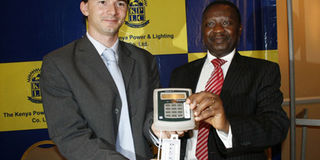Prepay meters help end landlord-tenant electricity wrangles

Actaris chief executive officer Christophe Viarnaud and Kenya Power and Lighting company managing director Joseph Njoroge displays an Electricity Pre Paid metering system on 20 February 2009 at the Stanley Hotel. Photo/FILE
What you need to know:
- Until recently, the landlord also had to ensure that the utility bills were paid to prevent inconveniencing the next tenant.
- The installation of prepaid electricity meters by Kenya Power at this particular block of flats in Umoja, Nairobi, eased the transition.
As he prepared to move houses last month in Nairobi, computer technician Fredrick Sande was a happy man since he knew he would have an easy time tying up loose ends as he vacated his former residence.
Some of the things the landlord checked were the general condition of the house, the paint on the wall, and the water and sewerage system.
Whether the house was in good shape or not, Sande knew the landlord would take part of his Sh14,500 deposit and use it to repaint the house.
Until recently, the landlord also had to ensure that the utility bills were paid to prevent inconveniencing the next tenant.
The installation of prepaid electricity meters by Kenya Power at this particular block of flats in Umoja, Nairobi, eased the transition.
The pre-paid initiative was rolled out by Kenya Power four years ago and the number of customers using prepaid meters has been rising steadily, with the power company expected to convert all its over two million customers to prepay at a cost of Sh12.6 billion.
'BEST THING EVER TO TENANTS'
Unpaid electricity bills were a major bone of contention between landlords and tenants, and often resulting in ugly wrangles.
“The prepaid meter is perhaps the best thing to have ever happened to tenants and landlords here in Nairobi.
They can now fight about everything else but electricity bills,” he noted.
According to Sande, the prepaid meter prevents defaults in electricity payments and thus safeguards landlords.
“When I was scouting for a new house, one of the things I considered was prepaid meters. I wanted to minimise chances of finding that the previous tenant had left without paying the power bill,” he said.
Besides that, with a prepaid meter, he knew the landlord will not ask him for electricity deposit.
“Some landlords demand up to Sh4,800 for electricity before they rent out their houses. The money was allegedly for meter deposit and was refundable,” said Sande. Most of the time, however, landlords did not refund the money, leading to quarrels with tenants. “Prepaid meters have made it difficult for landlords to ask for the deposit,” he said.
SANITY TO THE HOUSING SECTOR
Prepaid meters are bringing sanity to the housing sector in Nairobi. “They have really minimised wrangles and are making tenants save the money landlords used to demand,” said office administrator Frida Wangui.
In some parts of the city’s residential areas, tenants share power meters and, therefore, bills.
“The caretaker would get the bill and divide it equally among the tenants. This often led to complaints,” said Simon Okoth of Kayole, a low-income settlement on the east of the capital.
To avoid this, tenants bought individual power meters to help monitor their consumption and they would then pay for only what they had consumed.
“But this method still had challenges since some people would not pay for their consumption, leading to disconnection,” said Okoth.
He explained that tenants have now fitted the imported prepaid meters to individual power meters.
“Those who used to ride on others by avoiding to pay electricity bills cannot do that any longer since they must pay first before they can have power,” said Okoth.
Bernard Ngugi, a caretaker at a flat in Kayole, said the meters have saved him the hassle of rationing power to avoid high costs. “Some landlords had to instal power breakers to discourage tenants from using gadgets that consume a lot of power. But prepaid meters have helped do away with the disruptive system.”
Use of prepaid metering system, according to Kenya Power, helps customers take control of their electricity consumption, thus promoting energy-saving.
Customers using the service also do not have to worry about power disconnections as they pay in advance.
One can purchase electricity tokens at Kenya Power dealers in estates or through mobile money. Over 70 per cent, according to the company, prefer mobile money. (Xinhua)





